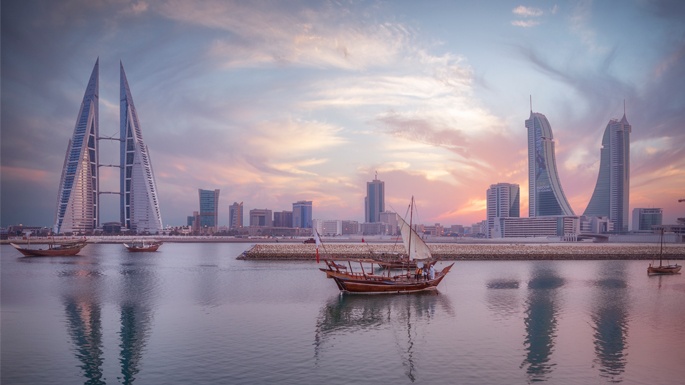
The Gulf state of Bahrain is rich in resources and attractions – now its forward-looking approach to business has also turned it into a tech hub, reports Colin Randall
Bahrain, a small island nation richly endowed with natural and man-made marvels, is transforming to a digital economy, thanks to its burgeoning status as a regional fintech leader and start-up hub.
Less than 50 years after it gained independence from Britain, the kingdom is committed to a bold diversification strategy that has helped it move beyond the region’s traditional reliance on oil. Underpinning that growth is a “cloud first” strategy and a thriving start-up scene, which has made it an innovation hotspot.
An archipelago of dozens of islands with a population of just 1.5 million and a land mass only marginally greater than that of the Isle of Man, Bahrain has a name that translates as “the two seas”, reflecting its salty ocean with fresh water springs lying beneath. Its ancient pearl diving heritage is renowned across the world. But beyond the natural charms is a vibrant, modern country punching above its weight.
Guided by the King, Hamad bin Isa al-Khalifa, and his eldest son, the Crown Prince Salman, the kingdom has efficiently built on its experience as a financial centre. At the heart of efforts to shape development is #TeamBahrain, a collaborative initiative in which the government and private sector are embracing digitisation to create an ecosystem of expertise, through venture capital companies, accelerator programmes and mentoring.
The Central Bank acts as a forward-looking regulator. And a willingness to break down barriers was a key factor behind the momentous decision by Amazon Web Services (AWS) to open its first data centre in Bahrain this year.
Speaking at the AWS summit in Bahrain’s capital Manama last September, Teresa Carlson, vice president of its worldwide public sector business, said the Crown Prince had identified the need for the country to undergo digital transformation.
“I think he saw the opportunity for this to help them jump-start the economy and make it a hub for innovation,” she said. “So they focused on strong cloud policies first; created the right telecoms policy; were one of the first to deregulate; they had good pricing for utilities; were friendly towards businesses, and had the kind of culture we felt could sit well with us and our partner communities.”
Bahrain announced this week that it is stepping up plans to roll out 5G networks across the kingdom – making it, by third quarter 2019, the first country in the world to have nationwide coverage. “Our leadership in 5G sends a signal to
the world that we can be a test bed for transformative technologies,” said Kamal bin Ahmed Mohammed, Minister of Transport and Telecoms.
Policies to broaden Bahrain’s economy – to support its “Economic Vision 2030” programme – are already producing results. The non-oil sector is rapidly growing, and oil now accounts for less than 20 per cent of GDP. This development continues apace despite a potential boost for Bahrain’s traditional oil wealth: the discovery of deposits estimated at 80 billion barrels of tight oil and 10-20 trillion cubic feet of deep natural gas off its west coast.
A $32 billion (£24 billion) infrastructure programme across a raft of industries will also enhance competitiveness. Social challenges faced before and since the Arab Spring are well known. But the country’s message to the world is that it offers an imaginative, welcoming environment for business, and a beautiful, friendly and safe destination for tourists.
The Crown Prince told the Bahrain Government Forum last October that the Vision 2030 programme is being pursued in line with three founding principles: “sustainability, competitiveness and fairness”. He vowed that, with government and private sectors acting under the #TeamBahrain umbrella, the kingdom’s “development, prosperity and greater opportunity for all will be guaranteed long into the future”.
(Originally published on The Times)



